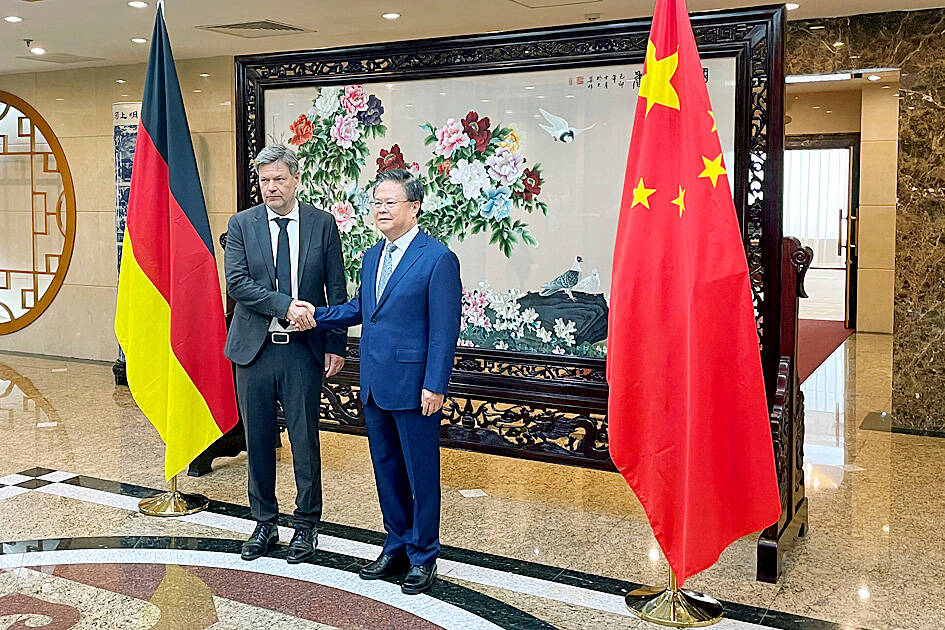The US Department of the Treasury on Friday fleshed out a proposed rule that would restrict and monitor US investments in China for artificial intelligence (AI), computer chips and quantum computing, while the German economy minister in China yesterday said that the EU’s door is open for discussions regarding tariffs on Chinese exports.
Washington’s proposed rule stems from US President Joe Biden’s executive order in August last year regarding the access that “countries of concern” have to US dollars that fund advanced technologies, which the US government says would enhance their military, intelligence, surveillance and cyber capabilities. The order identified China, Hong Kong and Macau as countries of concern.
The proposed rule outlines the required information that US citizens and permanent residents must provide when engaging in transactions in the area, as well as what would be considered a breach of the restrictions.

Photo: Reuters
It specifically would prohibit US investors from funding AI systems in China that could be used for weapons targeting, combat and location tracking, among other military applications, said a senior Treasury official who previewed the rule for reporters on condition of anonymity.
The Treasury is seeking comment on the proposal through Aug. 4, and after that is expected to issue a final rule.
In Beijing yesterday, German Minister for Economic Affairs and Climate Action Robert Habeck told Chinese officials that proposed EU rules on Chinese goods are not a “punishment.”
Habeck’s visit to China is the first by a senior European official since Brussels proposed hefty duties on imports of Chinese-made electric vehicles (EVs) to combat what the EU considers excessive subsidies.
“It is important to understand that these are not punitive tariffs,” Habeck said in the first plenary session of a climate and transformation dialogue.
Countries such as the US, Brazil and Turkey had used punitive tariffs, but not the EU, he said. “Europe does things differently.”
Habeck said that for nine months, the European Commission had examined in great detail whether Chinese companies had benefited unfairly from subsidies.
“Common, equal standards for market access should be achieved,” Habeck said.
Meeting Chinese National Development and Reform Commission Chairman Zheng Shanjie (鄭珊潔) Habeck said the proposed EU tariffs were intended to level the playing field with China.
“We will do everything to protect Chinese companies,” Zheng said.
Proposed EU import duties on Chinese-made EVs would hurt both sides, he added.
After his meeting with Zheng, Habeck spoke with Chinese Minister of Commerce Wang Wentao (王文濤), who said he would discuss the tariffs with EU Commissioner for Trade Valdis Dombrovskis yesterday evening via videoconference.
“What I suggested to my Chinese partners today is that the doors are open for discussions and I hope that this message was heard,” Habeck said in Shanghai later. “This opens a phase where negotiations are possible, discussions are important and dialogue is needed.”

NATIONAL SECURITY THREAT: An official said that Guan Guan’s comments had gone beyond the threshold of free speech, as she advocated for the destruction of the ROC China-born media influencer Guan Guan’s (關關) residency permit has been revoked for repeatedly posting pro-China content that threatens national security, the National Immigration Agency said yesterday. Guan Guan has said many controversial things in her videos posted to Douyin (抖音), including “the red flag will soon be painted all over Taiwan” and “Taiwan is an inseparable part of China,” while expressing hope for expedited “reunification.” The agency received multiple reports alleging that Guan Guan had advocated for armed reunification last year. After investigating, the agency last month issued a notice requiring her to appear and account for her actions. Guan Guan appeared as required,

A strong cold air mass is expected to arrive tonight, bringing a change in weather and a drop in temperature, the Central Weather Administration (CWA) said. The coldest time would be early on Thursday morning, with temperatures in some areas dipping as low as 8°C, it said. Daytime highs yesterday were 22°C to 24°C in northern and eastern Taiwan, and about 25°C to 28°C in the central and southern regions, it said. However, nighttime lows would dip to about 15°C to 16°C in central and northern Taiwan as well as the northeast, and 17°C to 19°C elsewhere, it said. Tropical Storm Nokaen, currently

‘NATO-PLUS’: ‘Our strategic partners in the Indo-Pacific are facing increasing aggression by the Chinese Communist Party,’ US Representative Rob Wittman said The US House of Representatives on Monday released its version of the Consolidated Appropriations Act, which includes US$1.15 billion to support security cooperation with Taiwan. The omnibus act, covering US$1.2 trillion of spending, allocates US$1 billion for the Taiwan Security Cooperation Initiative, as well as US$150 million for the replacement of defense articles and reimbursement of defense services provided to Taiwan. The fund allocations were based on the US National Defense Authorization Act for fiscal 2026 that was passed by the US Congress last month and authorized up to US$1 billion to the US Defense Security Cooperation Agency in support of the

PAPERS, PLEASE: The gang exploited the high value of the passports, selling them at inflated prices to Chinese buyers, who would treat them as ‘invisibility cloaks’ The Yilan District Court has handed four members of a syndicate prison terms ranging from one year and two months to two years and two months for their involvement in a scheme to purchase Taiwanese passports and resell them abroad at a massive markup. A Chinese human smuggling syndicate purchased Taiwanese passports through local criminal networks, exploiting the passports’ visa-free travel privileges to turn a profit of more than 20 times the original price, the court said. Such criminal organizations enable people to impersonate Taiwanese when entering and exiting Taiwan and other countries, undermining social order and the credibility of the nation’s